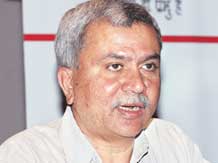 For once, the topic of discussion at an informal meeting of faculty members at the office of Trilochan Sastry, professor at Indian Institute of Management (IIM)-Ahmedabad, some time in 1999, wasn't organisational behaviour or leadership challenge.
For once, the topic of discussion at an informal meeting of faculty members at the office of Trilochan Sastry, professor at Indian Institute of Management (IIM)-Ahmedabad, some time in 1999, wasn't organisational behaviour or leadership challenge.
The group discussed the ever-increasing hold of money and muscle power in politics and the need to do something to stop this disturbing trend. At the end of the meeting, while others had doubts about going beyond their core-competency, Sastry decided it was his duty to change the way elections were conducted in the country.
The next day, he visited Gandhinagar and managed to procure a nomination form, which, to his astonishment, had just four columns - name, age, father's name and address - to be filled by candidates contesting the elections. The least one could do, he thought, was ensure the candidates told more about themselves while seeking votes from the people.
| ADR'S JOURNEY SO FAR |
|
What followed was a public interest suit in the Delhi High Court, seeking details on educational, financial and criminal backgrounds of contestants. After the matter reached the Supreme Court, in 2002 and 2003, it made it mandatory for candidates to disclose their criminal, financial and educational backgrounds by filing an affidavit with the Election Commission before the elections.
At the insistence of the lawyer representing his case, Sastry contacted his colleagues and acquaintances - eight faculty members of IIM-Ahmedabad, two alumni and one professor from the National Institute of Design, Ahmedabad - and formed the Association for Democratic Reforms (ADR), with 11 founding members.
ADR, a non-profit organisation, has already analysed about 68,000 affidavits, covered two Lok Sabha, 57 Assembly and six local-body elections. It runs an SMS service that gets 1,000-1,500 queries about candidates and elected representatives every day. Its helpline, offering details of members of Parliament and Legislative Assemblies, receives about 75 calls a day. www.myneta.info, an ADR-run website containing the details of all candidates who have fought elections since 2003, records about 20,000 visitors a day.
"We want the largest democracy to become the best-functioning democracy," says Ajit Ranade, IIM-Ahmedabad alumnus, a founding member of ADR and chief economist with the Aditya Birla Group.
Along the way, several of ADR's reports have made headlines. One such report, on how the 2009 Lok Sabha elections saw a rise in the incidence of muscle power compared to 2004, was widely covered. Another report, on how one in four contestants hadn't disclosed permanent account numbers (PAN) in the recent Assembly elections in five states, was featured in Business Standard.
Some call it a movement, others say ADR has become a quiet agent for change, bringing out timely reports to make people aware of the candidates they are about to choose as their representatives. It is a precursor to the much-needed electoral reforms, they argue. However, for members of team ADR, it is their duty. "It is a passion, not just a job for us," says ADR software analyst Pulkit Agrawal. Senior programme associate
K Srinivasulu and programme associate Shivani Kapoor agree. With a modest budget, ADR has managed to build a 30-member team that comprises members from the Indian Institutes of Technology, agriculture scientists and lawyers. Its national coordinator, Anurag Mittal, is a risk and compliance professional who has worked with organisations such as the World Bank, American Express, Bank of American and Deloitte.
The first few years of ADR's existence were extremely challenging, says Jagdeep Chhokar, another co-founder and former director in-charge of IIM-Ahmedabad. "We had a hard time finding affidavits. The Election Commission would refuse to give us access to these. After years of persuasion, it agreed to put all the affidavits on the website. Now, we collect all the data from the EC website. Once we get the data, we try to ensure voters get access to that information at least a week before the polling," he says.
Helping ADR in its voter-awareness drive is a network of nearly 1,200 voluntary organisations, under the National Election Watch umbrella. Through its associates and a host of television partners, it runs the Mera Desh, Mera Vote campaign.
"Our endeavour is intended to help voters make an informed choice and all our campaigns have that objective in mind," says Chhokar. Five years ago, actor Aamir Khan, too, pitched in with a video message, exhorting voters not to succumb to bribing while making their choice.
Taking this message forward, ADR is launching a campaign, 'My vote is not for sale', ahead of the coming Lok Sabha elections. Eminent personalities such as former chief justice M N Venkatachaliah, former chief election commissioners J M Lyngdoh and T S Krishnamurthy and former comptroller and auditor general C G Somiah have lent their support to the organisation.
But ADR isn't satisfied with merely raising voters' awareness about the financial and criminal backgrounds of poll candidates. Its agenda also includes restoring inner-party democracy in parties and ensuring transparency in political funding. It has also filed an appeal with the Central Information Commission, seeking its direction on getting elected representatives put their income tax return in the public domain, similar to political parties.
For Sastry, founder and now a professor at IIM-Bangalore, the journey has just begun. "The influence of money and muscle power in elections has not come down yet. But the awareness has definitely gone up, which is a positive sign," he says.

